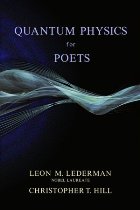 By Leon M. Lederman, Christopher T. Hill, Prometheus Books, 338 pages
By Leon M. Lederman, Christopher T. Hill, Prometheus Books, 338 pages
“In not one of the many episodes of Star Trek, however, or to our knowledge any other science fiction saga, has there ever been as bizarre an exploration of the universe as that which actually took place on planet Earth in the period 1900 to 1930 CE. The distances traveled by the explorers of the early twentieth-century scientific age were similarly vast, but not in the sense of the large scales of billions and billions of light-years of intergalactic space. Rather, it was a voyage into the deep, the unknown, and the unexplored space of the smallest object that makes up the entire universe, down to the scale of billionths and billionths of an inch.”
The Sciences and Humanities were not always seen as so different. The gulf between them did not always seem as vast as it does now. At the beginning of the Enlightenment as the elements were being discovered and the secrets of electricity and magnetism were being revealed the two fields were quite familiar with each other. The poet, Coleridge was friends with many of Britain’s earliest scientists and was intimately familiar with their works as were Shelley and Byron. This intimacy was lost though as the sciences becoming ever more steeped in the arcane of mathematics. Leon Lederman and Christopher Hill mean to correct that with their Quantum Physics for Poets. The book is both a historical and explanatory look at the how we today explain our world and why it has proven so difficult for not only poets, but everyman sans physicists to grasp. They do a wonderfully admirable job at it too until the very end where despite the lack of mathematics, the topic becomes so complicated that their analogies begin to break down and the reader might very well find themselves, like me, scratching their head.
Reviewed by Jonathon Howard

